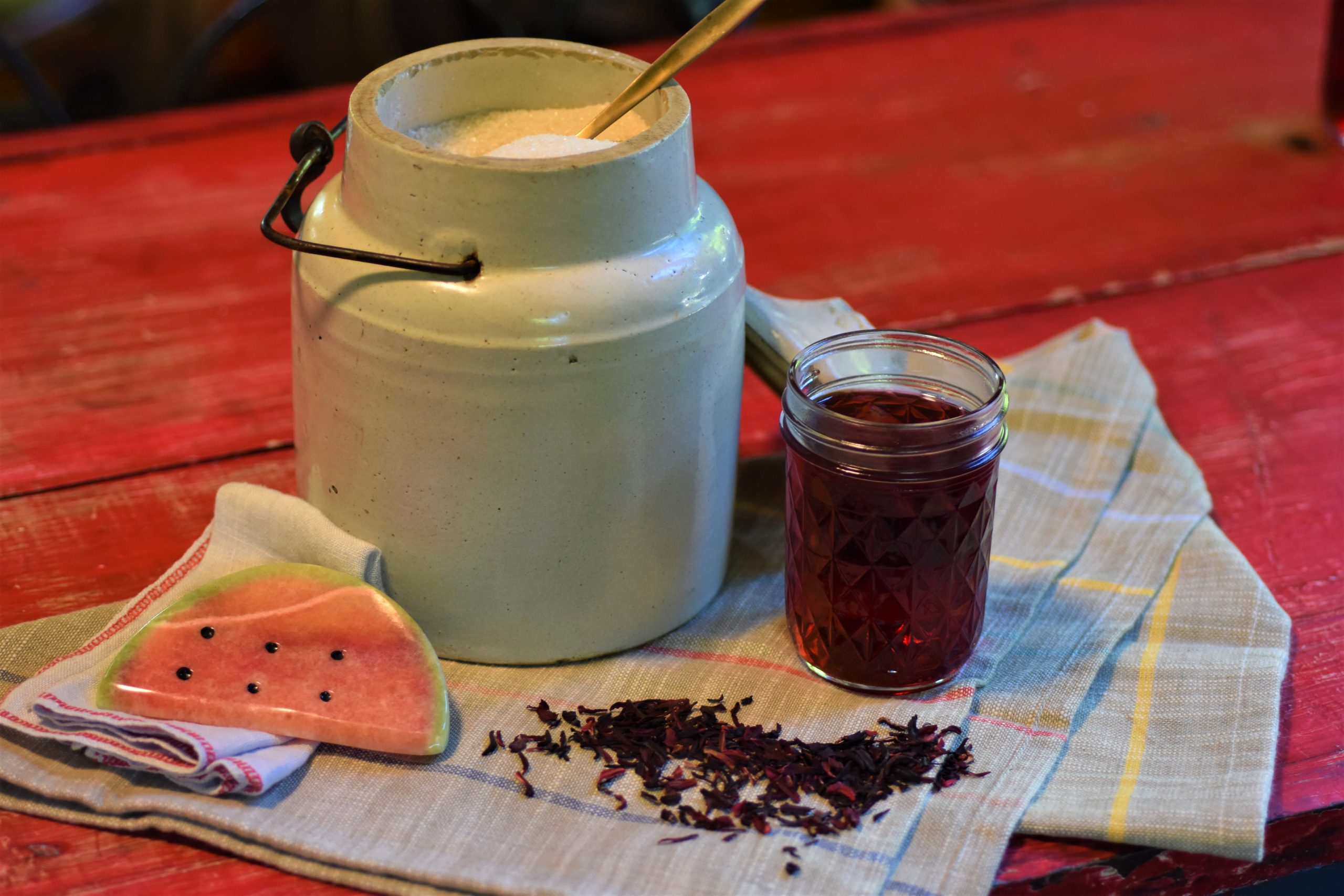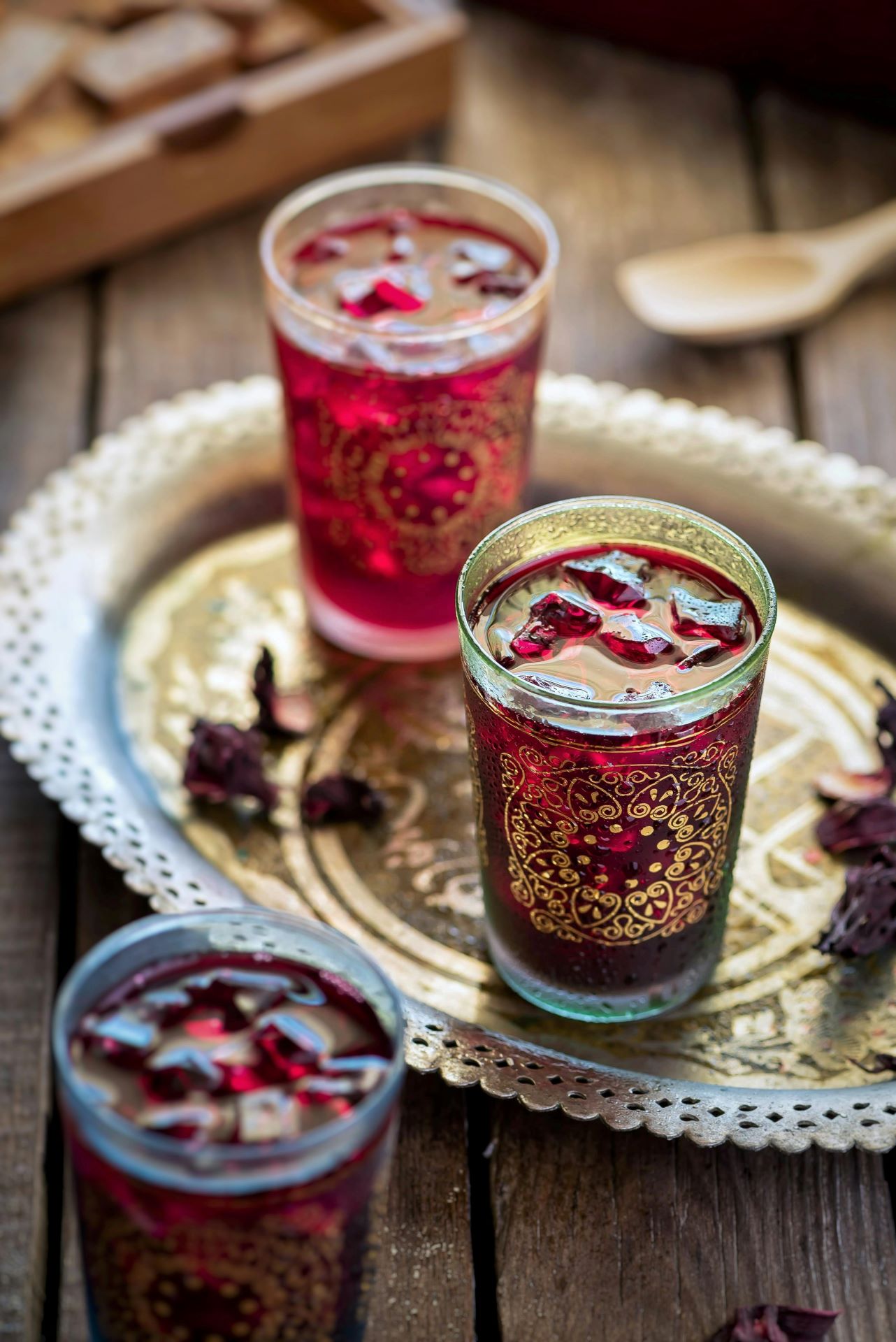Hibiscus Tea and more, by Greta de la Montagne SWSBM alum ‘92, Registered Herbalist(AHG), Gentle Strength Botanicals, and LMTC herbalist consultant
Brew yourself a deep ruby red cup of hibiscus tea, and join me to learn about this large, showy flower in the mallow family!
People drink tea from Hibiscus sabdariffa all over the world, hot or cold. The infusion tastes sour, tart-meets-sweet, like dried cranberry but more complex. It has a lovely citrusy note and a hint of raspberry.
Vitamin C Galore
Hibiscus tea contains 43.6mg of Vitamin C per cup, making it an extremely rich source. Vitamin C does many amazing things in the body! It helps promote a healthy immune system and brain, repair tissue, heal wounds, staunch excessive bleeding, promote the absorption of iron, promote cartilage formation, clean arteries, stabilize blood sugar, and create healthy skin, hair, and nails. Hibiscus is one of the richest plant sources for chromium, and may help stabilize blood sugar levels. Therefore, hibiscus may be especially helpful for hypertension, atherosclerosis, type II diabetes, and metabolic syndrome.
Research suggests that bioflavonoids and Vitamin C have a complementary effect. Brew hibiscus tea with dried rosehips—along with salt and sugar 1:2—for a powerful electrolyte rehydration formula. This pairing has a profound anti-inflammatory and anti-viral effect.
Lake Missoula’s Skin Glow blend incorporates both rosehips and hibiscus. Our Sakura Cherry Green tea blend makes a colorful, sweet-and-tart thirst-quencher. Explore all of our hibiscus blends.
I’m getting thirsty for another cup of hibiscus and rosehip tea right now! If you poured too much of yours, add a splash of Fire Cider, a squeeze of fresh lime, and stick it in the fridge for a tasty shrub cocktail later on in the evening.
Other Health Benefits
Hibiscus is an antioxidant, reducing the damage done by free radicals in the body. Daily antioxidant consumption can lower cancer risk and cardiovascular disease. Hibiscus tea is also high in beta-carotene, anthocyanins, and amino acids.
Primary Actions: Antidiabetic, antihypertensive, antioxidant, mild diuretic, subtle laxative.
Hibiscus tea is good for those suffering from/and:
- blood pressure problems
- heart ailments
- strokes
- obesity
- overcoming mental weakness
- enhancing memory
- strengthening bones
- cardiovascular diseases
- decreases the rate of alcohol absorption, so the juice is a great choice for cocktails
The American herbal products industry (particularly the American Botanical Council, which scans products for adulterants) identified most bulk ascorbic acid used in the vitamin industry is imported from China, where it’s derived from citrus fruits of unknown origin. Synthetic ascorbic acid (the purest form of Vitamin C) used in the oral supplement industry comes from GMO corn and is processed with a host of chemicals including acetone. YUCK! Another good reason to avoid high-cost manufactured supplements. Drink dried hibiscus flower tea from a source you trust.
Extracts of hibiscus have anti-aging effects on the skin. Studies show it prevents and treats melanoma. Hibiscus calyx juice might be beneficial for treating cancer, with all those antioxidants that perform free radical scavenging. Human cell line studies by Akim et al. 2011 show that hibiscus juice may cause cancer cell death, so the extract may have potential uses in cancer-related diseases. The extract can also regulate lipid metabolism and reduce cholesterol levels in the body.
Side effects from hibiscus tea are uncommon, but could include stomach upset, gas, and indigestion. All things in moderation!
A Deeper Dive: cultivation
The hibiscus genus comprises roughly 300 hundred species, native to warm temperate, subtropical, and tropical regions.
Part used: dried calyxes (sepals of a flower) for tea. Leaves are used as an edible vegetable in tropical and subtropical regions around the world, like a spicy version of spinach. Calyxes can be used fresh or candied.
Taxonomy: Each hibiscus flower has both male and female parts. The ovary and other female parts of the flower lie in the main structure of the hibiscus. The pistil, which is long and tubular, has five “hairy” spots at the top that make up the stigma, where pollen is collected.
Other names: Rose/Swamp mallow (eastern US), Ambashthaki (Sanskrit), Karkadeh (Arabic), Florida cranberry, Rose of Sharon (Hibiscus rosa-sinensis), Japakusum (“Japa” in Ayurveda), China rose, Shoeblack plant (Jamaica) “Drink of the Pharaohs” (Egypt), Lalambari (Hindi),
Cottonrose hibiscus (Hibiscus mutabilis): mu fu rong ye (Cottonrose hibiscus leaf, Chinese) Terrengganuu (Malaysia)
Other names for hibiscus tea: Rosella or Roselle (Africa), Agua Fresca de Jamaica (Mexico), soborodo, sorrel drink or sour tea, sorrel(India), Karkade (Egypt), bissap (Senegal)
Cultivation: Rapid germination, will grow in containers or in the ground. Needs full sun and a long growing season. A deep root system makes it drought tolerant. Frost tender, edible leaves, woody perennial, hardy annual, blooms mid-late October. Showy in the garden, with red stems and stalks. Rosella hemp extracted from the stems makes a strong fiber for making sacks, twine, and cords.
Hibiscus and Culture
Other interesting uses: The flowers were traditionally used to polish shoes in Jamaica and some African countries. The juice in the petals is used as shoe-blacking, eyebrow dye, and mascara in China. Native Hawai’ians used the bark to make a dye to disguise their fishing nets and lines. In India, it’s made into a scalp lotion called “stop hair fall” (japakusum); the oil and extract are great for dry hair, alopecia, conditioning the scalp, and stimulating follicular hair growth.
Culture and mythology: Hibiscus is important in Hindu mythology, associated with the goddess Kali, who represents power, transformation, change. It’s considered one of the most auspicious things you can offer to that deity. Hibiscus flowers are sacred to Ganesh, the elephant god and protector of children, the god of wisdom who destroys all obstacles and grants the realization of all goals, who dwells in the first (or root) chakra. Hibiscus flower offerings to Ganesh bring blessings and good fortune. The flowers are important in all pujas (devotional ceremonies) and have a similar energy to lotus and rose flowers. The plant is also part of Polynesian culture, in which a myth links the birth of red hibiscus to the red face of a human. The blossoms are beloved in South Korea and Malaysia, who claim hibiscus as their national flower.
Contraindications: (Based on 2-4 cups ingested/day) May interfere with anti-Malarial drugs. May interact with other drugs used for diabetes and high blood pressure. “Appears safe for all patients to use in tandem with other herbs and pharmaceuticals.” (Dr. Jill Stansbury)
Endnotes
Sources: Web Med, NIH.gov, Wikipedia https://en.wikipedia.org/wiki/Roselle_(plant), “Herbs of Commerce” 3rd edition, AHPA, https://plants.ces.ncsu.edu/plants/hibiscus-sabdariffa/,
“The Yoga of Herbs” by Dr. David Frawley and Dr. Vasant Lad, “Body into Balance” by Maria Noël Groves, “Herbal Formularies for the Health Professionals Vol2, Circulation and Respiration” by Dr. Jill Stansbury, ND,
Further research: https://www.ncbi.nlm.nih.gov/pmc/articles/PMC8834068/#:~:text=Hibiscus%20extracts%20have%20been%20reported,and%20Alzheimer’s%20disease%20%5B43%5D.
Hibiscus extracts are reported to reduce brain pathology and biochemical indices of oxidative stress when injected intraperitoneally into mice in models of Parkinson’s disease and Alzheimer’s disease. Jan 27, 2022.
sorrel drinks: https://pubmed.ncbi.nlm.nih.gov/15383229/




